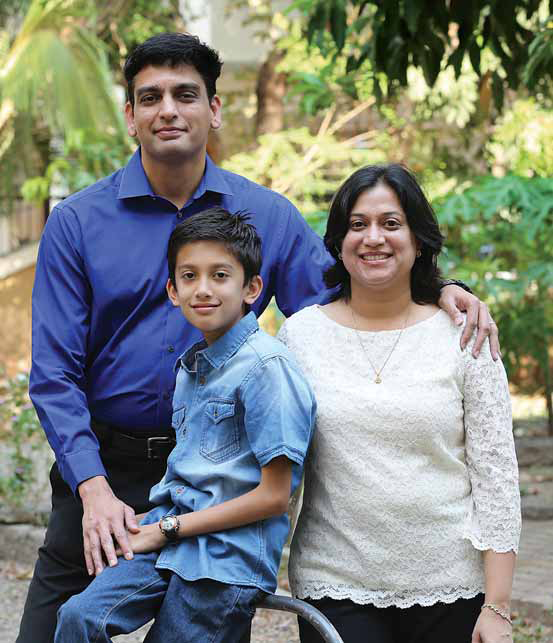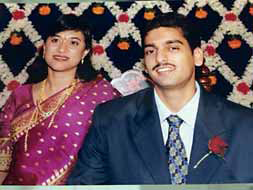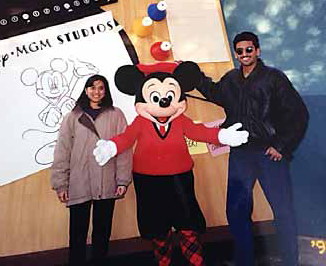
It is not often these days that a college romance fructifies into a wedlock. Corporate Citizen unlocks the story of love that has culminated into marriage, for we believe in the stability of a relationship and family unit. We bring to you real-life romances that got sealed in marriage
Relationship_and management gurus will have you know that working together is not a great idea for a married couple. Double the stress, double the chances of stepping on each other's toes, and just about half the space. Ah, but that's theory.
In practice, things can and do work out well. It just depends on the individuals involved. Ask Bela Kher (40) and Milind Chitambar (41). Married for over 16 years _ and employed with Capgemini (for even longer)_their partnership both at the work and home front has worked out well, thanks.
"Being employed with the same organisation can be a boon, provided you are reasonable about it. It helps you understand each other's stress and issues; at the same time, it is possible to share a quick meal or chat over a pressing matter," says Bela, a delivery manager with Capgemini. "It also helps to have an extended group of friends and work associates who form an important part of your environment."
That said, they work on different projects and do not directly work with/associate with each other, adds Milind, a Director with the company. "It's a careful balance, but it's not difficult," he points out.
Soft ware couple Bela Kher and Milind Chitambar on how their marriage is a winning combination of opposite personalities_and a shared value system; and how being employed with the same organisation has actually worked out in their favour
While Bela is a BE (Electronics) from Pune's COEP, Milind completed his BE in Computer Science from Government College of Engineering (Aurangabad.) Both met in the US in 1999 while on deputation for a project. "I was attracted to her simplicity and her smile," shares Milind. "She does not talk a lot, but is sincere and committed to whatever she takes up."
As far as Bela was concerned, she liked him for his friendliness and open-mindedness. "I had heard of him while in Pune, but had actually never got around to knowing him. As we got talking, we realised we shared a lot in common, besides our similar education and family back-grounds. Both of us, for example, enjoy sports and music. So we had a lot to talk about."
Interestingly, Milind is also conversant with astrology; however, he denies to the day that his decision to marry Bela had anything to do with the stars. "He says he did not consult the charts," she smiles.
A year after, they returned to India to formalise their nuptials. "Here's where both sets of parents finally met each other," says Milind. "While they were curious, they left our choice of partner entirely to us, because they trusted our judgment and the fact that we were old enough to decide. Besides, thanks to the similarities in education and cultural backgrounds (both are Maharashtrians), there wasn't much to object in the first place."
The couple returned to the US for the next few years, before finally returning to India in 2004.
"Both of us believe that all a kid really needs is love," says Milind. "While Bela is particular about his studies, neither of us believe in pressurising the child. Let him take up what he loves and enjoys."

"Those early days we spent with each other laid the foundation of our relationship," reminisces Milind. "In the absence of family and friends we grew to depend on each other. In my case, I am grateful for her calming presence in my life, and that she helped me channelise my energies in a more focused manner.
I would highly recommend this investment of time to each and every couple as the initial days of your marriage set the tone for the rest of your life.
Sure, careers are important, but it is crucial to know each other as well. It is entirely possible to achieve this in the IT world, with one partner taking on a more challenging job profile, even as the other takes on a less demanding one. But simultaneously taking on high-stress assignments is not a great idea."
For her part, Bela says the shared itinerary of common hobbies_is very comforting. "We listen to old Hindi songs, catch late night movies and stay up talking late," she says.
Another favourite pastime is visiting amusement parks. "We did a lot of this in the US. The scarier the ride, the better," she grins. "Be it roller-coasters or the House of Horrors, we simply thrive on the adrenaline pumping experience. Luckily our son has also inherited this complete lack of fear from us."
Another boon is the support system the couple enjoy from their parents. "Thanks to my in-laws' presence our son Tanish (now 11) never had to be put in day care. Besides, his parents are very encouraging of my dreams, and I really appreciate it."
Parenting is another area of teamwork. "I tend to be the stricter parent, while he is easier-going," says Bela. "For me, it is important to lay down a structure and discipline vis-à-vis his studies and other activities. On the other hand, Milind tends to focus on exposing him to different stimuli like sports and good films that assist his overall personality growth. Of course, I too, enjoy reading books with Tanish and playing an occasional board game."
"Both of us believe that all a kid really needs is love, "says Milind. "While Bela is particular about his studies, neither of us believe in pressurising the child. Let him take up what he loves and enjoys."
Quality time as family includes vacations that give them time to unwind, swim and relax. "Honestly, I don't see the point of hectic and chock-a-block tours," says Bela.
So who apologises in case of fights and disagreements ? "It all depends on the situation," says Bela. "Whoever is responsible tends to accept the onus."

"While I personally have nothing against couples that choose to live in, it was never an option for us," says Bela. "We rooted for family, and the stability provided by a married family life and that has held us in good stead."
Even as Milind does concede that the corporate world can be tricky territory indeed. "One hears of affairs happening at the work place, simply because of the number of hours you put in. Also, earlier on, women were not financially stable, and hung on to relationships out of lack of choice. These days, however, everyone seems to have too many choices. The key, once again, is correcting the balance, reworking priorities and spending more time with family."
Personally, he gives all credit to their middle-class upbringing for inculcating a basic "integrity" towards every aspect of their life. "We value our work and relationships, and take nothing for granted," he says. "Also, it has taught us patience even in the face of tough professional experiences."
A lot of young IT professionals find themselves in big cities sans family as the grounding factor. "But even in such cases, families and parents can stay in touch with the youngsters. A phone call or two, on a daily basis makes all the difference in the world. At the end of the day, the choices a person makes, boils down to whether or not they feel loved and valued. If they do, they would automatically think twice about making decisions that are likely to let down those who trust them."
By Kalyani Sardesai